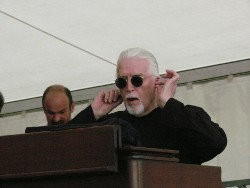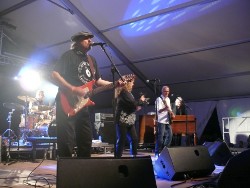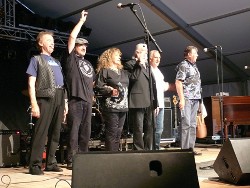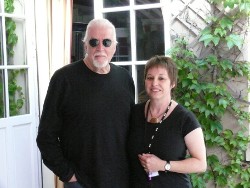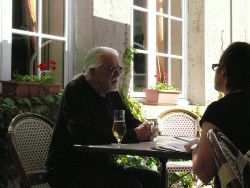
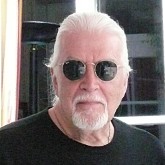
 © Copyright 2011 Rock Interviews dot com, Photos Rock-Interviews.com.
© Copyright 2011 Rock Interviews dot com, Photos Rock-Interviews.com.


 © Copyright 2011 Rock Interviews dot com, Photos Rock-Interviews.com.
© Copyright 2011 Rock Interviews dot com, Photos Rock-Interviews.com.


Interview - Jon LORD - Friday 24th June 2011
Blues en Bourgogne Festival

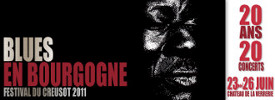

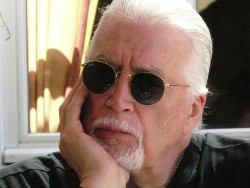
Thank you very much. It's good to be here.
AM : What is your first impression about this festival ?
It seems to be run by people who are very enthusiastic and it's 20 years going,
that's a pretty good record. I don't play a lot of Blues festivals of course,
I play a lot of rock festivals in my time. It seems that the man who runs this
is an enthusiastic man and a very friendly man, he seems to know what he is doing,
and it's a beautiful position, a beautiful area.
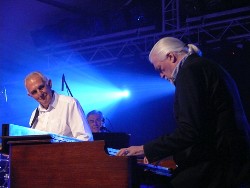
It's wonderful, it's a very long history. One of the great pleasures of being
a traveling musician is that we get to see great places, we get to play in
unusual places, such as this, and to spend a couple of days in lovely places,
so it's a blessing to be a musician!
It's a miracle. (laughing). Just briefly, the story of the
Hammond organ
is that an american gentleman, I believe, in the 20s or 30s somewhere around there,
I'm not quite sure of my dates, he was a church member and the church at which he
worshipped was in need of an organ but they couldn't afford to buy one of this pipe organ,
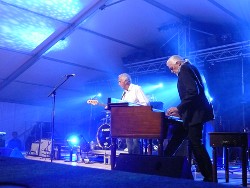 so Mr Hammond who was a clockmaker by profession said that he would try to make one.
His idea was to make an electronic simulation of a church organ sound, and he did this
by having these things called drawbars, they are the things that go in and out on the
top of the Hammond and the idea was that each one of these, the more you pull it out,
the louder it would be, but each one would be a different sound, like the different
sounds on the pipes on an ordinary or a regular church organ. He made the sound and
the reason it's so unique as an organ, as a concept, is the way the sound is made.
The sound is generated mechanically by little wheels that spin around very,
very quickly and produce an electronic signal that is then converted into sound
by the magic of the whatever goes on inside, that is much as I know about it,
but it created this wonderful sound and if you wanted to sound like a church organ
then of course it can, but then it found its way into jazz and then into popular
music and then a couple of really great players discovered it, first of all a guy
called
Wild Bill Davis
and then of course
Jimmy Smith
and
Jimmy McGriff
and so on, great jazz, blues musicians, who discovered that it makes this really good sound
for jazz and then people of my generation, we discovered it and I certainly discovered
that it makes a very good sound for rock music too, so it's a very clever organ.
so Mr Hammond who was a clockmaker by profession said that he would try to make one.
His idea was to make an electronic simulation of a church organ sound, and he did this
by having these things called drawbars, they are the things that go in and out on the
top of the Hammond and the idea was that each one of these, the more you pull it out,
the louder it would be, but each one would be a different sound, like the different
sounds on the pipes on an ordinary or a regular church organ. He made the sound and
the reason it's so unique as an organ, as a concept, is the way the sound is made.
The sound is generated mechanically by little wheels that spin around very,
very quickly and produce an electronic signal that is then converted into sound
by the magic of the whatever goes on inside, that is much as I know about it,
but it created this wonderful sound and if you wanted to sound like a church organ
then of course it can, but then it found its way into jazz and then into popular
music and then a couple of really great players discovered it, first of all a guy
called
Wild Bill Davis
and then of course
Jimmy Smith
and
Jimmy McGriff
and so on, great jazz, blues musicians, who discovered that it makes this really good sound
for jazz and then people of my generation, we discovered it and I certainly discovered
that it makes a very good sound for rock music too, so it's a very clever organ.
AM : Compared to the piano, is the technique very different ?
Yes, for example without having to be able to show you, but to try to describe it,
if you hit a single note on a piano just like this (imitating the sound, bump) it would ring
in the air (imitating the sound, bump) if you do this with a Hammond it goes (bup),
it's just bup, so if you want to play legato smoothly on the piano, you use your fingers
of course but you also have a pedal which will sustain the sound for you, whereas with
the organ you don't have a sustaining pedal, so it's a different way of fingering and a
different way of playing. I must say that when I started playing the Hammond in the 60s,
it destroyed my piano technique and then when I started playing the piano again more
seriously in the mid-90s I went back to the piano and I discovered that my technique
was compromised, so I had to work very hard to get my piano technique back, and now
I think I have a way of playing both, without one hurting the other,
but the techniques are very different.
1983 I think.
AM : 83, sorry OK, what are your best memories with these 2 bands ?
There are two great periods for me with Deep Purple, maybe three,
but the two great periods to me are 69,70,71, these first three years with
Ian Gillan
and
Roger Glover
in the band, when we invented something,
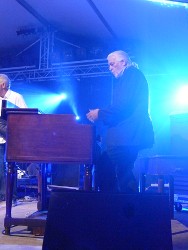 we discovered something very real and very exciting and I think very good,
I'm very proud of it, so that period to me is very important.
Then the reunion 84-85, those two years were also enormous fun to be back
together with these five guys in the same room, smiling at each other,
this was wonderful, so those two periods I think were the best. My time
in Whitesnake was really, it was like being on holiday, I didn't really
have much of a role, not much of a part to play in Whitesnake,
I was just a keyboard player, and it was David's band and I was really only
suppose to stay for a couple of years, but two years went into three years,
and three years went into four years, then five years. I was in the band and
I got a phone call from Ian Gillan, after I had decided to leave Whitesnake
in 1973 I had had enough, I didn't think I was adding anything,
I didn't like the direction that David was taking the band into this more
American rock style, I love the original style of Whitesnake, the white
rhythm'n'blues style which I found very exciting, very interesting, very humorous,
good fun, because that's the music I started to play when I was a young man,
my first band was a rhythm'n'blues band so you know this kind of music is in my blood,
so when Whitesnake started to change I started to lose my excitement with the band,
then I got a phone call from Ian Gillan which changed the whole world,
he said would you like to reform the band and I said when? Now. yes, come on, let's do it!
we discovered something very real and very exciting and I think very good,
I'm very proud of it, so that period to me is very important.
Then the reunion 84-85, those two years were also enormous fun to be back
together with these five guys in the same room, smiling at each other,
this was wonderful, so those two periods I think were the best. My time
in Whitesnake was really, it was like being on holiday, I didn't really
have much of a role, not much of a part to play in Whitesnake,
I was just a keyboard player, and it was David's band and I was really only
suppose to stay for a couple of years, but two years went into three years,
and three years went into four years, then five years. I was in the band and
I got a phone call from Ian Gillan, after I had decided to leave Whitesnake
in 1973 I had had enough, I didn't think I was adding anything,
I didn't like the direction that David was taking the band into this more
American rock style, I love the original style of Whitesnake, the white
rhythm'n'blues style which I found very exciting, very interesting, very humorous,
good fun, because that's the music I started to play when I was a young man,
my first band was a rhythm'n'blues band so you know this kind of music is in my blood,
so when Whitesnake started to change I started to lose my excitement with the band,
then I got a phone call from Ian Gillan which changed the whole world,
he said would you like to reform the band and I said when? Now. yes, come on, let's do it!
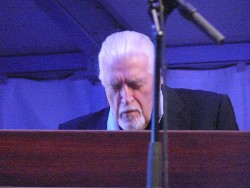
Oh yeah. I've got a lovely e-mail from them on tour because it was my birthday
last week or the week before, and I got e-mails from the two Ian's and a phone call from Roger.
AM : If they ask you one day to be their guest for a show, will you accept the invitation ?
Yeah, I think so, I mean it depends what they invited me for,
if it's just for a little bit of fun, yes, that seems a good idea.
I've done it because I've played with them a couple of times, twice in London,
once in Tokyo, and I'm playing with them again in a couple of weeks time,
we're playing on the same stage. I don't know if I will be playing with them,
they will have to ask me.
Very much so, when I was walking back from the soundcheck, just a few minutes ago,
I was thinking to myself you know, how lucky I am to be able to really play what I want.
I think I've earned it, I've been performing, a traveling musician for over 45 years,
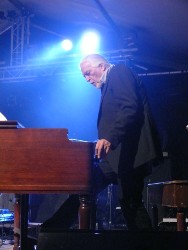 it's a huge long time and a lot of work and a lot of stress,
a lot of good times and bad times, a lot of mediocre times but mostly good,
and I think what I thought when I left at the end of 2002 that I would first just
sit down and think to see what I could do with my life, I knew only this,
that for me continuing with Deep Purple was a law of diminishing returns.
I was getting less and less from the music and it was costing me more and more energy,
so the return was not right and also I think the most important thing that maybe my
performance certainly had begun to slip down a little bit, certainly not far enough
to be bad, but to the point where I thought I'm just doing this by numbers in a way,
most nights were just repeating and it seemed that the element of improvisation was
going a little bit out of the band, what we had when we made Purpendicular in 94
with
Steve Morse,
it was just fantastic. By 2001-2002 the feeling for me,
I'm not blamig the band, this is not their fault, this is my fault,
I really thought that I needed to do something else, and I wasn't quite sure
what it was but I knew there was a lot of music I wanted to write, there was
a lot of things that I had to say no to, when I wanted to really say yes,
so it was an opportunity to say yes a little bit more.
it's a huge long time and a lot of work and a lot of stress,
a lot of good times and bad times, a lot of mediocre times but mostly good,
and I think what I thought when I left at the end of 2002 that I would first just
sit down and think to see what I could do with my life, I knew only this,
that for me continuing with Deep Purple was a law of diminishing returns.
I was getting less and less from the music and it was costing me more and more energy,
so the return was not right and also I think the most important thing that maybe my
performance certainly had begun to slip down a little bit, certainly not far enough
to be bad, but to the point where I thought I'm just doing this by numbers in a way,
most nights were just repeating and it seemed that the element of improvisation was
going a little bit out of the band, what we had when we made Purpendicular in 94
with
Steve Morse,
it was just fantastic. By 2001-2002 the feeling for me,
I'm not blamig the band, this is not their fault, this is my fault,
I really thought that I needed to do something else, and I wasn't quite sure
what it was but I knew there was a lot of music I wanted to write, there was
a lot of things that I had to say no to, when I wanted to really say yes,
so it was an opportunity to say yes a little bit more.
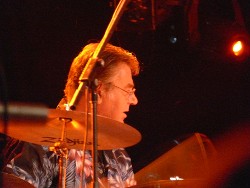
Well the answer is basically the same, the answer is both yes and no.
Yes on some levels and no on other levels. Let's deal with the no first.
People in an orchestra are still performing musicians and they still have
hearts and souls and beliefs and the desire to be as good as they possibly can be.
They are playing mainly, 99 percent of what they play is written down,
so they are trying to make the music live off of the page, to take it off of
the page and make it live, and of course their way of arriving at their position
is different, they study normally several years at the conservatoire or music
school or university, whatever it may be, and the competition for places in
orchestra is huge and so these are just as emotional and strong feeling musicians
as a rock, blues or jazz musician, it's just obviously a difference in style and
in content of course, but in the end, what we are doing as musicians is trying
to convey emotion to get to you, inside you, from my heart to talk to your heart
not so much from my mind to talk to your mind, and I think that it is the same
if you are a violonist in a symphony orchestra or a guitarist in a rock band.
Yes. What I wanted to do, I've done so much work on it, in the last four or five years.
I've played it now sixty, seventy maybe eighty times in these last eight years, ten years.
I've worked really hard on the score to make it the best I can to take the advantage of
how much better a composer I am now, than I was when I was 28 years old, I know much more
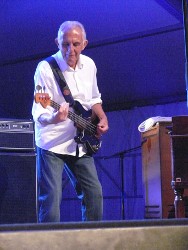 about the orchestra, how to make it sound, how it works and I thought, forgive me for
sounding a little immodest, but I think it's a good piece, I think it has work to do,
it says something very definite, it's very much a love letter from me to two musical
loves of my life, the orchestra and the rock band and it's very much me saying we can
play together, we really can, if we forget about our differences, and of course these
days is much more normal to play much more than it was in 1969, when I wrote it.
So what I wanted to do was to have the definitive recording in a studio because it has
two live recordings but I wanted to do it in studio conditions so that I had complete
control over the sound and the performance. We did it and now I'm working on finishing
it and I am going to use different guitarists for each movement. We want to use a more
bluesy one for the central movement and several people have said they would like to
play on it, so I'm waiting to see which is the best, not the best three but the three
that are most right for it. Then maybe when I do know then is that after I'm gone this
recording would be there and the score would be there and it would say exactly what
I wanted there, so people in a hundred years time if they want to play it, they would
know exactly how it is supposed to be played, I wanted very much to have this definitive
recording and I was very lucky to be get it done this summer.
about the orchestra, how to make it sound, how it works and I thought, forgive me for
sounding a little immodest, but I think it's a good piece, I think it has work to do,
it says something very definite, it's very much a love letter from me to two musical
loves of my life, the orchestra and the rock band and it's very much me saying we can
play together, we really can, if we forget about our differences, and of course these
days is much more normal to play much more than it was in 1969, when I wrote it.
So what I wanted to do was to have the definitive recording in a studio because it has
two live recordings but I wanted to do it in studio conditions so that I had complete
control over the sound and the performance. We did it and now I'm working on finishing
it and I am going to use different guitarists for each movement. We want to use a more
bluesy one for the central movement and several people have said they would like to
play on it, so I'm waiting to see which is the best, not the best three but the three
that are most right for it. Then maybe when I do know then is that after I'm gone this
recording would be there and the score would be there and it would say exactly what
I wanted there, so people in a hundred years time if they want to play it, they would
know exactly how it is supposed to be played, I wanted very much to have this definitive
recording and I was very lucky to be get it done this summer.
Well, if you find out, perhaps you let me know! (laughing). I have no idea, you know,
sometimes it comes to me in the middle of the night, I wake up and think, oh what was that,
just rattling around in my head. So it's very annoying for my wife, because I try to
be very quiet to find a little bit of paper, and she says : Put the light on! you know,
and I write it down, or when I'm walking with the dog or on my own in the fields,
or improvising playing the piano, sometimes it's just a good idea that comes on its own,
and other times it's just maybe "un morceau" and you have to work on it, to make it grow,
to make it live, and refine, so there's inspiration and there's perspiration, they both go
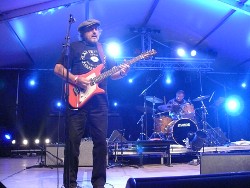 hand in hand. I love the process, I adore the process of you know sitting with a piece of
blank paper and a pencil and then suddenly, oh that's an idea let's see where this goes,
I love that, it's one of the great joys of being a musician.
hand in hand. I love the process, I adore the process of you know sitting with a piece of
blank paper and a pencil and then suddenly, oh that's an idea let's see where this goes,
I love that, it's one of the great joys of being a musician.
AM : What do you think is the most difficult thing for a young musician and a composer ?
The most difficult thing for a young musician is to find acceptance, because there are
so many of us, and the most difficult thing is to remain patient and to keep working and
hoping that something will happen, I think that must be the most difficult. I was very lucky,
I mean I work for nearly five years as a musician before Deep Purple. It was hard work
and nothing happened, I had a moderate bit of success with the first band, we had one record,
just went in to the charts one week and then went down again. When I wrote Concerto for
Group and Orchestra I was hugely lucky that it had actually got performed, otherwise it
could just have been an idea on a piece of paper in a drawer and it could have stayed
there forever. Luck plays an important part, but it's very difficult to say to a young
musician maybe you'll get lucky, so what you have to say is that all you must do is be
ready for when your moment comes, in other words, you work, you work, you work,
you practice, you practice, you parctice, so when your moment comes, if it comes,
you are as good as you can possibly be, that's really all you can hope for.
AM : It is also maybe to create a sound, your own sound.
Absolutely, certainly in the world of popular music, such as blues, jazz and rock,
it's very important to be seen as an individual, but you can't just look in the mirror
and go, okay I'm going to be an individual. So this again is all part of the work process,
I think you have to work hard in order to discover something about yourself that you
think is different to somebody else.
It all started last year.
Pete York
the drummer called me and said look I have been asked,
there's a Blues festival, where was it ? Somewhere in Germany in the Rhineland,
and they would like us to play, you and me, and I said what ? Well he said that,
it's a Blues Festival, because we had played Blues gigs before Peter and myself
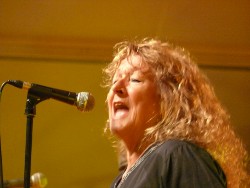 in the eighties and the nearly nineties, we did a few, and he said would you fancy that ?
I said sure. So we decided we will ask
Miller Anderson,
Colin Hodgkinson,
Zoot Money,
and
Maggie Bell
and it would seem like a good idea, so we went to this Blues festival
near Koblenz in the Rhineland in Germany, and we absolutely thoroughly enjoyed ourselves
we had the most marvellous evening, just playing the music that he and I and all of us
in this band had played since we were first musicians, you know this good, old-fashioned,
honest rhythm'n'blues, with no pretention, no show, it's just six musicians who love each other,
love each other's music and who want to play together and want to say to the audience
listen we think you'll like this, come on, come inside. So we dit that and then we were
asked to do another one, so we did that, then there are promoters around calling my agency
saying would Jon do this for us ? And suddenly you know If you put my name on the poster
maybe more people would come down, more than if it was just Miller on the poster or Pete,
only because of my previous success. I'm happy about that, and it's really revisiting my past,
I love it, there's no hassle, no stress, there's just pure enjoyment, it's hard work of course,
you have to play and sweat and make it move, make it happen but my goddess me I'm having fun,
I think by the end of this year I would have done eighteen or twenty of these concerts
and next year, people are already calling, so maybe I have to become a R'n'B musician
again for a couple of years before I can go back to being a composer.
in the eighties and the nearly nineties, we did a few, and he said would you fancy that ?
I said sure. So we decided we will ask
Miller Anderson,
Colin Hodgkinson,
Zoot Money,
and
Maggie Bell
and it would seem like a good idea, so we went to this Blues festival
near Koblenz in the Rhineland in Germany, and we absolutely thoroughly enjoyed ourselves
we had the most marvellous evening, just playing the music that he and I and all of us
in this band had played since we were first musicians, you know this good, old-fashioned,
honest rhythm'n'blues, with no pretention, no show, it's just six musicians who love each other,
love each other's music and who want to play together and want to say to the audience
listen we think you'll like this, come on, come inside. So we dit that and then we were
asked to do another one, so we did that, then there are promoters around calling my agency
saying would Jon do this for us ? And suddenly you know If you put my name on the poster
maybe more people would come down, more than if it was just Miller on the poster or Pete,
only because of my previous success. I'm happy about that, and it's really revisiting my past,
I love it, there's no hassle, no stress, there's just pure enjoyment, it's hard work of course,
you have to play and sweat and make it move, make it happen but my goddess me I'm having fun,
I think by the end of this year I would have done eighteen or twenty of these concerts
and next year, people are already calling, so maybe I have to become a R'n'B musician
again for a couple of years before I can go back to being a composer.
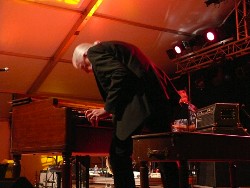
Hobbies, I don't know whether you call them hobbies, the boring answer for you is that
unfortunately music is not just my life, it's my hobby too, I love it, you know,
I love to read about it, I love to read history of music, the life of the composers,
to learn more about this style and that style, so that in a way is a hobby, I love to read.
I love to ski, but not as much as I used to, I can't go as fast as I used to, I can go as
fast as I used to, but I don't want to go as fast, because I am a little worried what
will happen if I fell over, once you get to my sort of age you don't particularly want
to be falling over at sixty kilometers an hour you know, but I do love to ski.
AM : Do you ski in France ?
I have skied in France, I've skied in Les 3 Vallées, several times,
but my normal skiing takes place in Zermatt in Southern Switzerland in the valley.
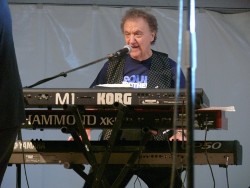
Yes.
AM : You did a Drama School.
I went to, two and a half years, at a drama School. I loved acting,
but you know when I left drama school I was one of maybe 500 actors looking for 50 jobs,
so I didn't get to do much acting, I get a couple of things in a historical play I stood
with a spear or said something like : Ah...the king is coming, you know, but one line.
So I was playing the piano to earn a little bit of money to survive, and here I am.
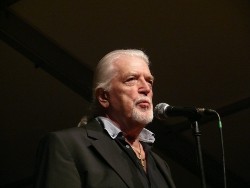
Plans, really just to continue to play where people ask me to.
For the foreseeable future I have requests to play my orchestral shows,
to come to play Concertos, to come to play the Sarabande suite, to come to
play with the Blues Project, to play the smaller shows that I sometimes do
with just piano, violin, cello, percussion and a couple of voices, just maybe
in a church, that sort of chamber, crossover. I don't know what you would call it,
so my wishes are that I wish and hope that people continue to ask me to play.
I hope I stay healthy, I am healthy, so let's hope, I touch wood that I stay healthy,
that my family stay healthy, that music doesn't go crazy, that people still remember
that it's a performance idiom. Of course you record it, of course you play it on your computer,
you play it on your Ipod, God knows what you'll be playing on in ten years time,
maybe you'll be playing on your spectacles, who knows, but it's still, good music
is about performing, about touching the hearts of an audience, so I hope that
I can continue to do that for as long as possible.
AM : Thank you very much for your time.
It's great pleasure.
AM : We wish you a great gig tonight, in this beautiful venue.
Thank you very much, you're welcome.
